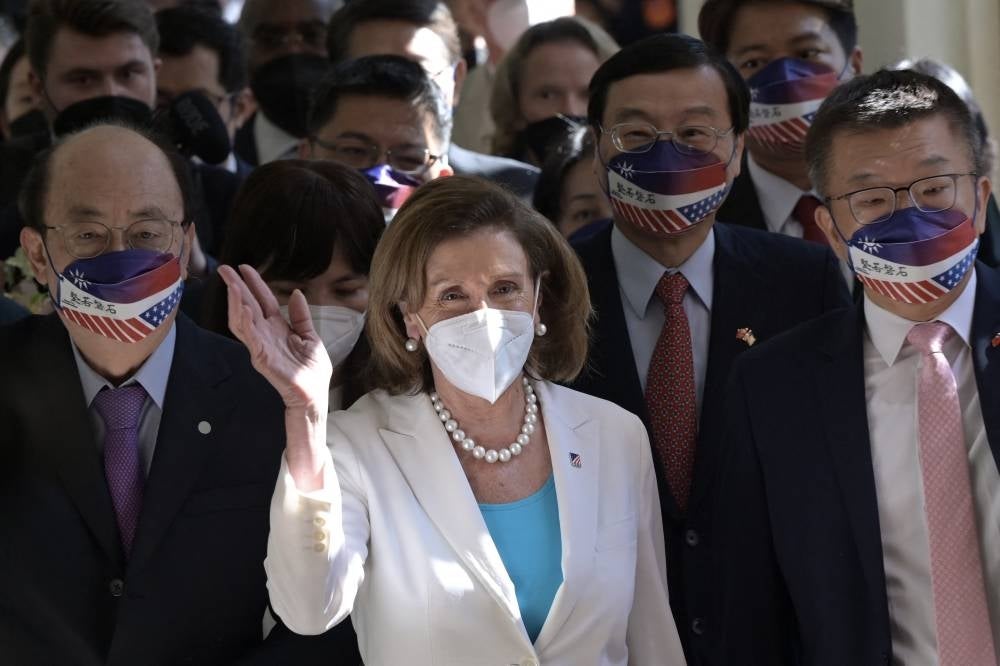Pelosi’s Taiwan visit and its implications
NIK LUQMAN WAN ZAINODDIN
The United States (US) House of Representative Speaker Nancy Pelosi is leading the US congressional tour to Asia, which is slated to visit Singapore, Malaysia, Japan, and South Korea.
Indeed, Pelosi’s Asia tour was not an overnight afterthought. The second-in-line for the US presidency after Kamala Haris, had the plan to undertake Asia tour earlier this year. But later postponed as Pelosi contracted Covid.
Interestingly, her initial plan was slated to include Taiwan, but later the US officials had to downplay Taiwan’s visit after security quarters raised concerns over bilateral relations between the US and China would be at stake should the visit proceeds.
When the US House speaker set her foot in Taipei on Aug 3, 2022, history has it that now Pelosi is the most senior US official to visit Taiwan after 25 years when her predecessor visited the self-ruled island in 1997.
As the US and China are involved in a somewhat geopolitical kerfuffle, Chinese President Xi Jinping warned the US not to “play with fire”, firing a salvo over Pelosi’s Taiwan visit.
The visit has indeed infuriated Beijing, which sees the island as a breakaway province that eventually will be unified with the mainland, by force if necessary.
Responding to Pelosi’s Taiwan visit, China via its People’s Liberation Army (PLA) has kicked off large-scale military drills encircling Taiwan in an attempt to form a naval blockade. Economically, China has also slapped a ban on foods, fruits, and vegetable imports from Taiwan.
And it appears that Beijing is ramping up pressure as multiple drills taking place with large-scale of air and naval joint drills in the wake of Pelosi visit, after the mainland warned it would respond with “the fiercest countermeasures”.
What are the implications?
For one, the US-China ties may have reached a new low point. Over the years, both Washington and Beijing have traded barbs and often find themselves at loggerheads over multiple issues.
Beijing regards Taiwan as its renegade territory and invariably pledges to pursue reunification with the mainland. Indeed, Pelosi’s visit serves as optics that Washington endorses Taiwan’s decades-old struggle for independence from the mainland.
Recent development also suggests that China’s military is stepping up its campaign encircling the island. And it is news that Beijing fires ballistic missiles into Taiwan’s 12 nautical miles of territorial waters, the closest ever.
And the escalation is most likely to persist, at least for now, and the US, China, and Taiwan cannot afford back down now without a slash at their credibility.
Indeed, Pelosi’s Taiwan visit is complicating all sides. For one, Beijing needs to react, otherwise, it risks losing credibility as it frames the island as a matter of protecting its territorial integrity.
On the one hand, Taiwan is in a tough spot too. Should the US decides to avoid visiting Taiwan in Pelosi’s Asia tour considering Beijing’s response, Taiwan may view the US as backtracking from its commitment to the island as a security guarantor.
By and large, the Taiwanese trusts the American on security issues and believes the American support towards Taiwan’s resolve.
But Taiwan realizes that it risks China’s retaliation if the visit takes place.
While on the part of the US, it risks escalation with Pelosi’s visit but would appear toeing Beijing’s line if it decides not to proceed with the visit.
Indeed, this puts all parties in tough spots. As of now, China is employing economic pressure and flexing military muscle to prevent further US engagement with Taiwan, without the use of force.
For the US, its strategic ambiguity under the Taiwan Relations Act serves as the guiding principle with which the US conducts its affairs, thus ensuring its place as a security guarantor to Taiwan, in the wake of China’s growing military presence.
Indeed, stable US-China relations have more advantages for the world community. This partly explains Asean’s reaction, calling for all parties to exercise restraint and urging to preserve regional peace.
Other likely spill-over effects would be major impacts on regional and global trade. According to Chatham House, an estimated $300 billion worth of trade is at risk, which passes the cross-strait area every month.
Already, China’s navy is employing an encirclement strategy in an attempt to form a de facto blockade of the island.
Ships and airplanes are not allowed to pass through. It is a blow to the regional trading system, which it will poses disruptions to shipping, incur additional costs, and interrupts inflows of raw materials.
The world is already seeing hikes in inflationary pressure, in the wake of Russia’s invasion of Ukraine.
Come what may, especially after Ukraine’s war fallout, the region and by extension the world, could not afford another crisis.
While peace and stability may appear luxurious these days, it is indeed within the best interest of all if the cross-strait tension could be lessened.
Nik Luqman is a foreign affairs columnist and was a research fellow at IKMAS UKM-Nippon Foundation. He tweets @Nluqman













